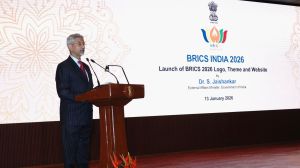In attendance
The death of the joint family system has had many casualties. But the worst hit have probably been the bed-ridden elderly. Time was when ...

The death of the joint family system has had many casualties. But the worst hit have probably been the bed-ridden elderly. Time was when the old were taken care of by the family till they died. But with nuclear families gaining ground, there is no one to look after the needs of the sick and old.
Like any other system, the collapse of one ushers in another, and the Ayah Bureau is the result of one such disintegration. Nowadays, falling sick means getting care not from your son, niece or a distant relative. It means getting your daily dose of TLC from the hands of the impersonal ayah.Says Masumi Shaikh, who, with her daughter Raiza, runs Pune8217;s first nursing bureau, the Zarine Nursing Bureau, 8220;Some years ago, one person worked for a living and six or seven could sit at home. But with inflation, no one can afford to do that anymore. Everyone has to go to work. So who will care for the sick?8221;
Most of the bureau8217;s clients are old people who are bed-ridden for various reasons. Says Murali Rawtani, who had employed the services of a professional ayah to care for his uncle, aunt and father, who were all bed-ridden before they died two years ago, 8220;My wife and I work, so looking after an ailing relative was practically impossible. Besides, it is not easy to be near a sick person 24 hours of the day. Who is to clean up the urine and stools of a bed-ridden person? The domestic maids refuse, so we had to employ people who would undertake to do that.8221;
Often caring for the bed-ridden involves work that no else is willing to do. This is probably what prompted nursing bureaus to expand their services to include ayahs. Says Shaikh, 8220;A nurse will not do the dirty work, in a manner of speaking. In fact, sometimes even family members find it hard to put up with bed-pan duty. They may do it for a day or a week, but after sometime, it is the ayah who fills that need. We have clients who employ ayahs for years together. I have had a client in Aundh, who had the same two ayahs for the past 10 years for his paralysed wife.8221;
Says Brinda Datey, who was a private nurse and now runs Datey Sisters, a nursing bureau, 8220;An ayah is always more in demand because she gives bed-pan service. Also, if the patient does not require medical care like injections or IV drips, then having an ayah is a more sensible option. Besides, at Rs 150 for a day, compared to Rs 250 for a nurse, an ayah is cheaper.8221;
Despite being more expensive than domestic maids, ayahs have an edge over the latter because of the rudimentary training that they receive before getting on to the job. Says Datey, 8220;I have 300 ayahs registered with me and I train them on the basics before employing them. I teach them Rial8217;s tube-feeding, bedsore dressing, sponging, bed-making, bed-pan nursing and cleanliness basics. This helps them handle bed-ridden patients better.8221;
This, of course, need not necessarily mean that the care is better than what the family can offer. Says Datey, 8220;I won8217;t say that ayahs provide better care than the family members because they are trained. Family members, though untrained in patient-care, are in a position to provide emotional support, an area in which an ayah8217;s service is limited.8221;
But it is to be better equipped to give emotional support that some use the services of an ayah. Says Namrata Chang, who has hired the services of a professional ayah for her ailing mother, 8220;When your parent is sick, you are dealing with it on two fronts 8211; physical and emotional. Earlier, my sisters and I used to take care of her physical needs as well. But then it was too much of a strain on us and it made us irritable.
8220;But ever since we decided to have an ayah for her, I am more relaxed. I am better equipped emotionally to deal with the trauma of her ailment and can be of more support to her.8221;
Seems like ayahs are here to stay, as long as there are ailing members in nuclear families and as long as there8217;s enough money to go around.
- 01
- 02
- 03
- 04
- 05































